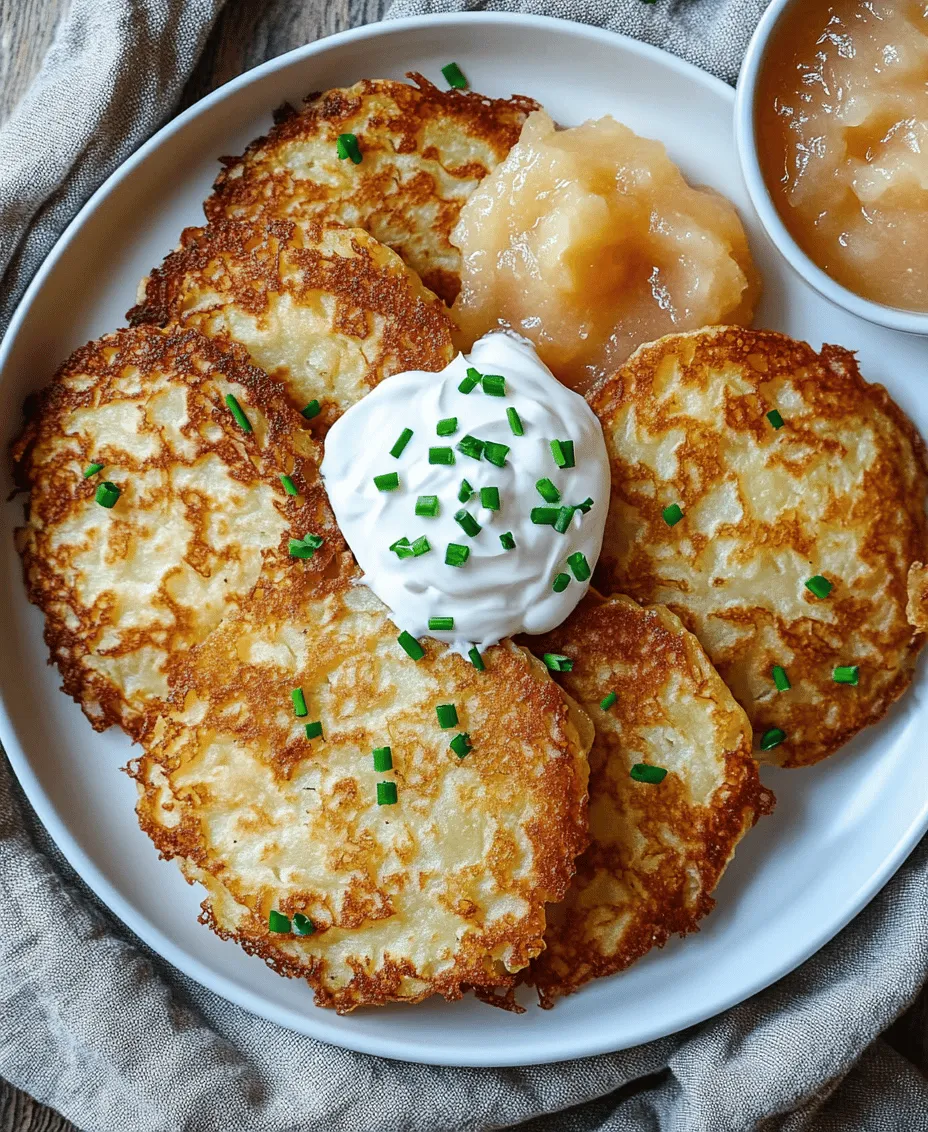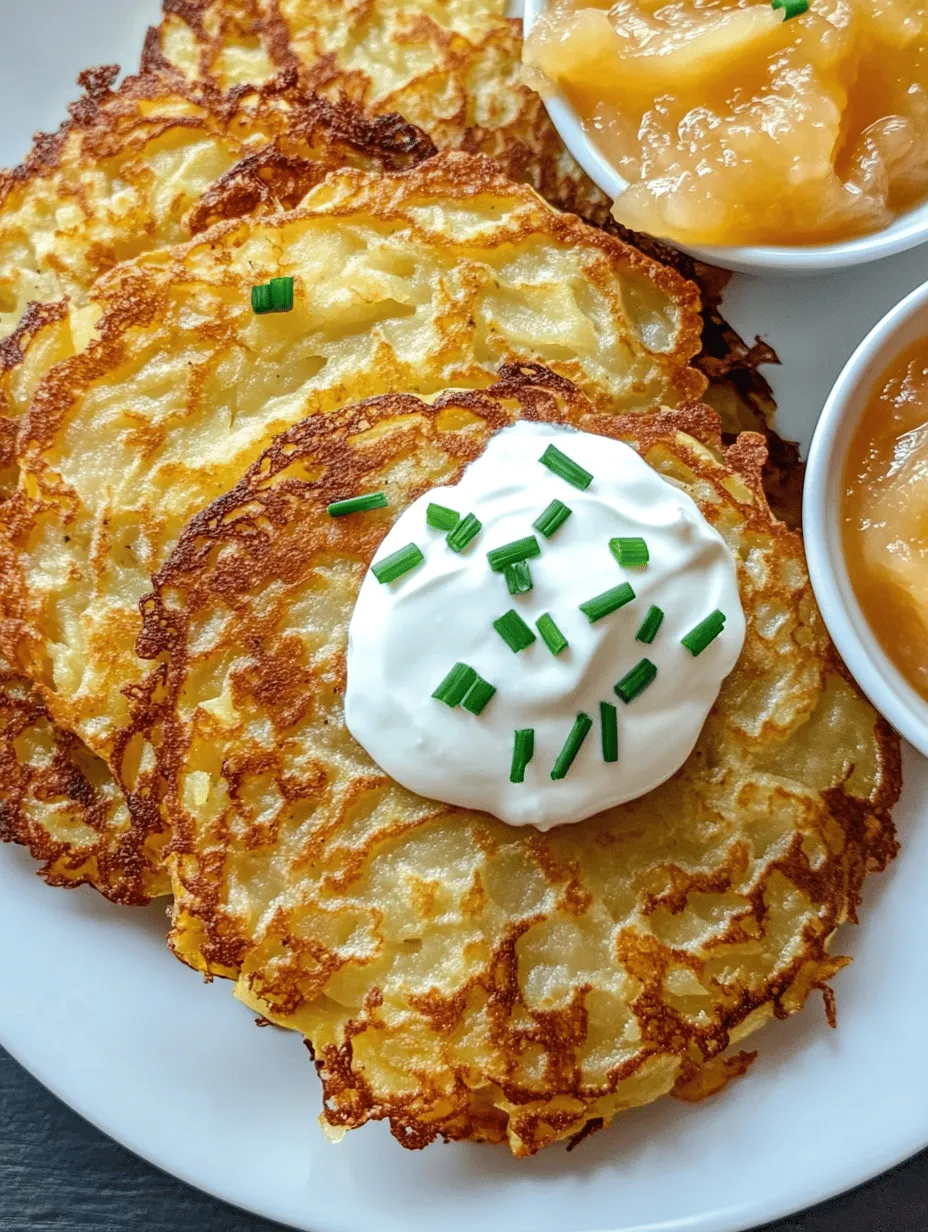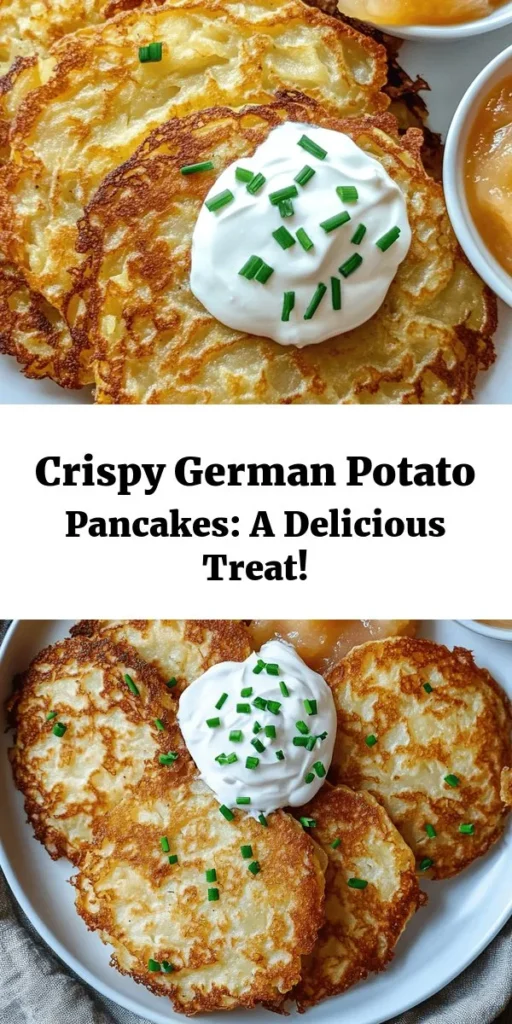Introduction
Reibekuchen, or authentic German potato pancakes, are a beloved staple in German cuisine, cherished for their crispy texture and delightful flavor. These golden-brown delights often evoke memories of festive holiday markets or cozy family gatherings, where the enticing aroma of frying potatoes fills the air. The cultural significance of Reibekuchen extends beyond mere nourishment; they symbolize tradition, comfort, and the joys of home-cooked meals.
Homemade potato pancakes are especially appealing to comfort food lovers who appreciate the simple pleasures of cooking from scratch. The process of transforming humble ingredients like potatoes, onions, and eggs into a delicious dish is not only satisfying but also a celebration of culinary heritage. This recipe for authentic German potato pancakes showcases the beauty of straightforward cooking, allowing anyone to connect with their inner chef.
Understanding Reibekuchen
The origins of potato pancakes can be traced back centuries in German culture, with variations found in many regions. Traditionally, Reibekuchen were made during harvest time, utilizing fresh potatoes that were abundant in the fall. These crispy treats were often enjoyed as a snack or served alongside hearty meals, reflecting the agricultural roots of Germany.
Across the country, different regions boast their unique takes on Reibekuchen. In the Rhineland, for example, the pancakes might be served with a side of applesauce, while in the north, they may accompany smoked fish. These regional adaptations highlight the versatility of potato pancakes, making them a beloved dish across Germany’s diverse culinary landscape.
To achieve the authentic flavor and texture of Reibekuchen, it is crucial to select the right ingredients. The choice of potatoes, for instance, plays a significant role in the final product. Using starchy varieties like russet potatoes can yield the perfect balance of moisture and starch, resulting in a crispy exterior and tender interior. The addition of onions enhances the flavor profile, bringing depth and a hint of sweetness to each bite.
Ingredients Breakdown
When preparing authentic Reibekuchen, it is essential to understand the role of each ingredient. Here’s a detailed breakdown:
1. Russet Potatoes: These starchy potatoes are ideal for making potato pancakes. Their high starch content helps bind the mixture together while ensuring a crispy texture. Russet potatoes are easily accessible and provide the perfect foundation for this dish.
2. Onion: Finely grated onion is a key ingredient that adds flavor and moisture to the pancakes. Onions not only enhance the taste but also lend a subtle sweetness that balances the earthiness of the potatoes.
3. Eggs: Eggs serve as a binding agent in the mixture, helping to hold the pancakes together during frying. They contribute to the overall richness of the dish, creating a satisfying mouthfeel.
4. Flour: A small amount of flour is added to provide structure and stability to the pancakes. While the goal is to keep the mixture light, flour helps absorb excess moisture, ensuring that the pancakes don’t fall apart in the pan.
5. Seasoning: Simple seasonings like salt and pepper are vital to enhancing the flavors of the pancakes. Some recipes also call for a pinch of nutmeg, which adds a warm, aromatic note that complements the potatoes beautifully.
6. Oil for Frying: The type of oil used for frying can make a significant difference in flavor and texture. Traditionally, neutral oils such as vegetable or canola oil are used, but some people prefer using a mix of butter and oil for added richness.
7. Serving Options: Reibekuchen are often served with a variety of accompaniments. Applesauce adds a sweet contrast to the savory pancakes, while sour cream provides a creamy tang. Fresh chives or other herbs can also be sprinkled on top for an added burst of flavor.
Step-by-Step Instructions
Preparing the Potatoes
The first step in creating delicious Reibekuchen is preparing the potatoes properly. To achieve the perfect texture, it’s crucial to remove excess moisture from the grated potatoes. This can be done by following these steps:
1. Grating the Potatoes: Use a box grater or a food processor to grate the potatoes. A box grater offers more control and a coarser texture, while a food processor can speed up the process. Regardless of the method, aim for evenly grated potatoes to ensure uniform cooking.
2. Removing Moisture: After grating, place the potatoes in a clean kitchen towel or cheesecloth. Gather the ends and twist to form a pouch. Squeeze firmly to extract as much moisture as possible. This step is crucial; excess moisture will lead to soggy pancakes instead of the desired crispiness.
3. Combining with Onion: Once the potatoes are adequately drained, mix in the finely grated onion. The moisture from the onion can help balance the mixture without compromising the texture.
Combining the Ingredients
Once you have prepared the potatoes and onions, it’s time to combine the ingredients to create the pancake batter. Here’s how to do it effectively:
1. Mixing the Base: In a large mixing bowl, combine the grated potatoes and onions. Add the eggs, flour, salt, pepper, and any optional seasonings like nutmeg. Stir gently until all the ingredients are well incorporated. The mixture should be thick yet cohesive.
2. Visual Cues: Look for a mixture that holds together but isn’t overly wet. The potatoes should be well-coated with the egg and flour, creating a pasty consistency that will bind the pancakes during frying.
3. Resting the Mixture: Allowing the mixture to rest for about 10-15 minutes can help the flavors meld and the starches to hydrate, which can improve the texture of the final pancakes.
With these initial steps completed, you are well on your way to creating authentic German potato pancakes that will delight your family and friends. The next part of the recipe will guide you through the frying process and additional tips for achieving the perfect Reibekuchen. Stay tuned for more delicious details on how to bring this beloved dish to your table!

Heating the Oil
To achieve the perfect texture and flavor in your authentic German potato pancakes, or Reibekuchen, heating the oil properly is crucial. For frying, you will want to use a neutral oil with a high smoke point, such as canola or vegetable oil. The ideal frying temperature is around 350°F (175°C). To test if your oil is hot enough, drop a small spoonful of the potato mixture into the oil. If it sizzles immediately and rises to the surface, the oil is ready for frying. If it sinks to the bottom, the oil is too cold; if it browns too quickly, the oil is too hot, so adjust the temperature accordingly.
Frying the Pancakes
Once your oil is heated, it’s time to fry the pancakes. Using a tablespoon or an ice cream scoop, portion out the potato mixture and gently drop it into the hot oil, taking care not to overcrowd the pan. Overcrowding can cause the temperature of the oil to drop, leading to soggy pancakes.
To shape the pancakes, use the back of a spatula to flatten them slightly, aiming for a thickness of about half an inch. This thickness allows them to cook thoroughly while achieving a crispy exterior. Fry the pancakes for about 4 to 5 minutes on each side, flipping them carefully with a spatula when they turn a rich golden brown. The ideal cooking time may vary depending on your stovetop and the size of your pancakes, so keep a close eye on them.
Draining and Keeping Warm
Once fried to perfection, it’s essential to drain excess oil from the pancakes to create a healthier dish. Place the cooked pancakes on a plate lined with paper towels to absorb any extra oil. For those who prefer extra crispness, you can place the drained pancakes on a wire rack instead of a plate, which allows air to circulate around them.
To keep the pancakes warm while you finish frying the rest, preheat your oven to 200°F (93°C) and place the drained pancakes on a baking sheet inside. This method will keep them warm without sacrificing their crispiness, allowing everyone to enjoy fresh, hot Reibekuchen together.
Serving Suggestions
Reibekuchen can be served in various ways, making them a versatile dish for any occasion. The most traditional accompaniment is applesauce, which adds a sweet contrast to the savory pancakes. A dollop of sour cream is another popular choice, offering a creamy, tangy flavor that complements the crispy texture of the pancakes beautifully.
For added flavor and a pop of color, consider garnishing your Reibekuchen with freshly chopped chives or parsley. This not only enhances the dish visually but also adds a layer of freshness that balances the richness of the fried potatoes.
If you’re looking for side dishes to enhance your meal, consider pairing Reibekuchen with a light salad, such as a simple green salad with vinaigrette, or a side of sautéed vegetables. These options provide a refreshing counterpoint to the hearty pancakes.
Nutritional Information
When it comes to nutrition, Reibekuchen can be a satisfying dish. A typical serving (two pancakes) contains approximately 300-350 calories, depending on the amount of oil absorbed during frying. They also provide a good source of carbohydrates and fiber from the potatoes, as well as vitamins such as vitamin C and potassium.
For those with dietary restrictions, modifications can be made to suit various preferences. To create gluten-free Reibekuchen, substitute regular flour with a gluten-free blend. You can also experiment with using cornstarch instead of flour for a lighter texture. For vegan options, consider using flax eggs (one tablespoon of ground flaxseed mixed with three tablespoons of water) in place of regular eggs, which will help bind the mixture without using animal products.
Cultural Significance and Enjoyment
Reibekuchen holds a special place in German culture, often associated with festive occasions and family gatherings. These crispy potato pancakes are frequently served at Christmas markets, where vendors fry them fresh to order, filling the air with their tantalizing aroma. Families often gather to create these pancakes together, sharing stories and laughter as they prepare this beloved dish.
Many who cherish Reibekuchen recall fond memories of their childhood, often associating the dish with warmth and togetherness. As one German grandmother puts it, “Making Reibekuchen is more than just cooking; it’s about bringing loved ones together around the table, sharing the joy of good food and good company.”
We encourage readers to share their experiences and variations of this recipe. Whether you’ve added your own twist or simply enjoy the traditional approach, engaging with others over this shared love of food can lead to new discoveries and delightful memories.
Conclusion
Making authentic German potato pancakes at home is a rewarding experience that brings joy and satisfaction. The process of grating, frying, and serving these crispy delights allows you to connect with the rich culinary traditions of Germany. Reibekuchen is not just a dish; it’s a celebration of flavors and textures that appeals to all ages, making it a perfect choice for family meals or festive gatherings.
As you embark on your culinary journey with these potato pancakes, remember that the beauty of this recipe lies in its versatility. Whether served traditionally with applesauce and sour cream or accompanied by fresh herbs and salads, Reibekuchen is sure to delight your taste buds.
We invite you to explore more traditional recipes from German cuisine to deepen your culinary experience. Each dish tells a story, and every meal shared can create lasting memories. Enjoy your journey into the delightful world of German cooking!
Authentic German Potato Pancakes
Ingredients


